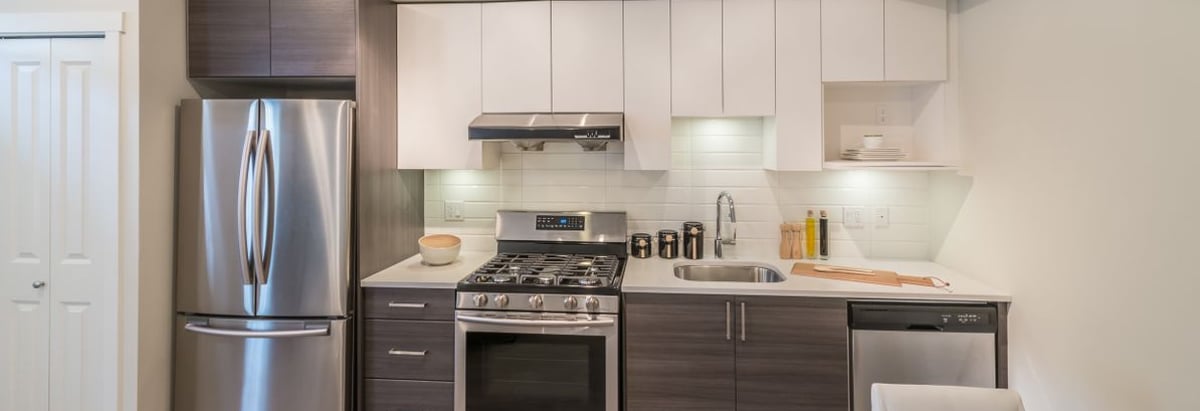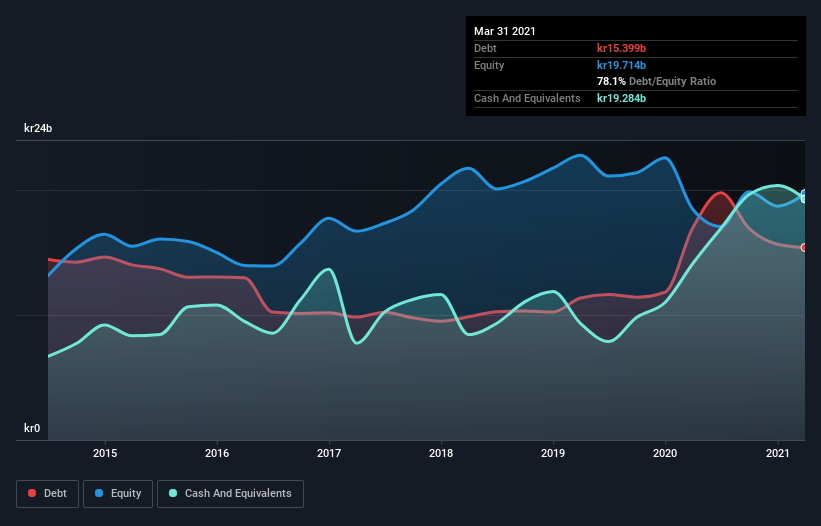
Howard Marks put it nicely when he said that, rather than worrying about share price volatility, 'The possibility of permanent loss is the risk I worry about... and every practical investor I know worries about.' So it seems the smart money knows that debt - which is usually involved in bankruptcies - is a very important factor, when you assess how risky a company is. Importantly, AB Electrolux (publ) (STO:ELUX B) does carry debt. But the real question is whether this debt is making the company risky.
When Is Debt Dangerous?
Debt assists a business until the business has trouble paying it off, either with new capital or with free cash flow. If things get really bad, the lenders can take control of the business. However, a more common (but still painful) scenario is that it has to raise new equity capital at a low price, thus permanently diluting shareholders. Of course, the upside of debt is that it often represents cheap capital, especially when it replaces dilution in a company with the ability to reinvest at high rates of return. The first step when considering a company's debt levels is to consider its cash and debt together.
See our latest analysis for AB Electrolux
How Much Debt Does AB Electrolux Carry?
You can click the graphic below for the historical numbers, but it shows that AB Electrolux had kr15.4b of debt in March 2021, down from kr17.0b, one year before. However, its balance sheet shows it holds kr19.3b in cash, so it actually has kr3.89b net cash.

A Look At AB Electrolux's Liabilities
We can see from the most recent balance sheet that AB Electrolux had liabilities of kr63.1b falling due within a year, and liabilities of kr22.4b due beyond that. Offsetting these obligations, it had cash of kr19.3b as well as receivables valued at kr21.9b due within 12 months. So its liabilities outweigh the sum of its cash and (near-term) receivables by kr44.3b.
This deficit is considerable relative to its market capitalization of kr66.6b, so it does suggest shareholders should keep an eye on AB Electrolux's use of debt. This suggests shareholders would be heavily diluted if the company needed to shore up its balance sheet in a hurry. Despite its noteworthy liabilities, AB Electrolux boasts net cash, so it's fair to say it does not have a heavy debt load!
Even more impressive was the fact that AB Electrolux grew its EBIT by 123% over twelve months. That boost will make it even easier to pay down debt going forward. There's no doubt that we learn most about debt from the balance sheet. But ultimately the future profitability of the business will decide if AB Electrolux can strengthen its balance sheet over time. So if you want to see what the professionals think, you might find this free report on analyst profit forecasts to be interesting.
Finally, while the tax-man may adore accounting profits, lenders only accept cold hard cash. While AB Electrolux has net cash on its balance sheet, it's still worth taking a look at its ability to convert earnings before interest and tax (EBIT) to free cash flow, to help us understand how quickly it is building (or eroding) that cash balance. Over the last three years, AB Electrolux recorded free cash flow worth a fulsome 84% of its EBIT, which is stronger than we'd usually expect. That puts it in a very strong position to pay down debt.
Summing up
Although AB Electrolux's balance sheet isn't particularly strong, due to the total liabilities, it is clearly positive to see that it has net cash of kr3.89b. The cherry on top was that in converted 84% of that EBIT to free cash flow, bringing in kr9.4b. So is AB Electrolux's debt a risk? It doesn't seem so to us. The balance sheet is clearly the area to focus on when you are analysing debt. But ultimately, every company can contain risks that exist outside of the balance sheet. For example, we've discovered 2 warning signs for AB Electrolux that you should be aware of before investing here.
If you're interested in investing in businesses that can grow profits without the burden of debt, then check out this free list of growing businesses that have net cash on the balance sheet.
If you decide to trade AB Electrolux, use the lowest-cost* platform that is rated #1 Overall by Barron’s, Interactive Brokers. Trade stocks, options, futures, forex, bonds and funds on 135 markets, all from a single integrated account. Promoted
New: Manage All Your Stock Portfolios in One Place
We've created the ultimate portfolio companion for stock investors, and it's free.
• Connect an unlimited number of Portfolios and see your total in one currency
• Be alerted to new Warning Signs or Risks via email or mobile
• Track the Fair Value of your stocks
This article by Simply Wall St is general in nature. It does not constitute a recommendation to buy or sell any stock, and does not take account of your objectives, or your financial situation. We aim to bring you long-term focused analysis driven by fundamental data. Note that our analysis may not factor in the latest price-sensitive company announcements or qualitative material. Simply Wall St has no position in any stocks mentioned.
*Interactive Brokers Rated Lowest Cost Broker by StockBrokers.com Annual Online Review 2020
Have feedback on this article? Concerned about the content? Get in touch with us directly. Alternatively, email editorial-team (at) simplywallst.com.
About OM:ELUX B
Undervalued with reasonable growth potential.
Similar Companies
Market Insights
Community Narratives



